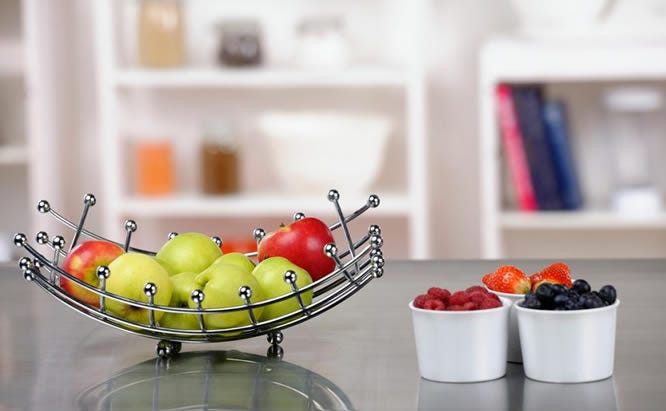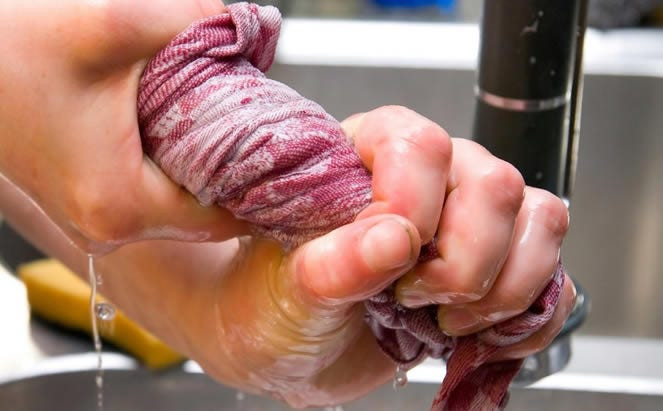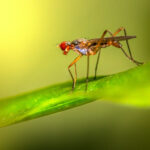Do Fruit Flies Die On Their Own? Yes, fruit flies will eventually die on their own if their food source is eliminated, but waiting isn’t the best solution, so flyermedia.net provides helpful insights into their lifespan, breeding habits, and effective methods to eliminate them. Learn how to manage these pests and maintain a fruit fly-free environment with our comprehensive guide covering fly control tips, preventative measures, and pest management strategies.
Table of Contents
- What Attracts Fruit Flies?
- Can Fruit Flies Make You Sick?
- Where Do Fruit Flies Lay Eggs?
- Can Fruit Flies Live in Drains?
- Do Fruit Flies Die in the Winter?
- Can Fruit Flies Get Through Screens?
- Why Are Fruit Flies In My Room?
- Will Fruit Flies Die On Their Own?
- Why Are Fruit Flies In My House Plants?
- How Can I Get Rid of Fruit Flies?
- FAQs About Fruit Flies
1. What Attracts Fruit Flies?
Fruit flies are attracted to the scent of ripe fruits, fermenting substances, and sugary spills, which makes kitchens and areas with exposed food prime targets.
These pests thrive on the sweet aromas emanating from overripe produce, alcoholic beverages, and even sugary residues from cleaning supplies. They are drawn to any fermenting organic matter, including spills and hidden sources of moisture, making thorough cleaning essential to prevent infestations.
2. Can Fruit Flies Make You Sick?
Fruit flies can transmit contaminants and bacteria, potentially causing illness if they come into contact with food.
These tiny insects pick up germs from the unsanitary surfaces they frequent, and their larvae, which develop in fermenting fruit, can introduce harmful bacteria. Consuming food contaminated by fruit flies or their larvae can lead to stomach distress and other health issues, underscoring the importance of proactive pest control.
 fruit bowl
fruit bowl
Fruit Bowl: A colorful display of various fruits, including bananas, apples, and oranges, sitting in a ceramic bowl on a kitchen counter, highlighting the attractants for fruit flies.
3. Where Do Fruit Flies Lay Eggs?
Fruit flies typically lay their eggs on the surface of overripe or rotting fruits and vegetables, as well as in moist, decaying organic matter.
Adult fruit flies seek out fermenting food sources to deposit their eggs, which hatch into larvae that feed on the decaying material. Common breeding sites include overripe produce, spills, and sludge accumulations in drains and garbage disposals. Eliminating these breeding grounds is essential for controlling fruit fly populations.
4. Can Fruit Flies Live in Drains?
Yes, fruit flies can live and breed in drains, as they provide a moist environment with decaying organic matter that serves as a food source.
Drains offer an ideal habitat for fruit flies due to the accumulation of food particles and moisture. Despite the occasional flushing of water, these pests can survive and thrive, laying eggs and multiplying within the drain’s confines. Regular cleaning and maintenance of drains are necessary to prevent infestations.
5. Do Fruit Flies Die in the Winter?
Fruit flies can survive the winter, particularly in warmer climates or indoors, where they continue to reproduce if food sources are available.
While cold temperatures can slow down their development and reproduction, fruit flies can overwinter in protected environments. In regions with mild winters or inside heated buildings, they remain active and continue to breed. Eliminating food sources and maintaining a clean environment are essential for controlling fruit flies year-round.
6. Can Fruit Flies Get Through Screens?
Fruit flies are small enough to potentially squeeze through the mesh of some window and door screens, especially if there are gaps or imperfections.
The effectiveness of screens in keeping out fruit flies depends on the size and condition of the mesh. While some screens may provide an adequate barrier, others may have openings large enough for these tiny insects to penetrate. Sealing gaps and ensuring screens are in good repair can help prevent fruit flies from entering your home.
7. Why Are Fruit Flies In My Room?
Fruit flies are attracted to any source of food or moisture in a room, including spills, overripe fruit, or even damp areas.
These pests do not discriminate when seeking nourishment. If they find food residue, sugary spills, or moisture in your bedroom, bathroom, or living room, they will stay and breed. Thorough cleaning and removal of attractants are crucial for eliminating fruit flies from any indoor space.
8. Will Fruit Flies Die On Their Own?
Yes, fruit flies will die on their own eventually, but the process can take a while and is not a practical solution for managing infestations.
If you eliminate their food sources and breeding sites, a fruit fly population will eventually diminish as adults die off and no new larvae hatch. However, this can take several weeks, during which the pests can continue to be a nuisance. Proactive measures such as trapping and cleaning are more effective for quick and thorough elimination.
Fruit fly trap: A close-up of a transparent fruit fly trap filled with a liquid attractant, with several dead fruit flies visible inside, demonstrating an effective method of pest control.
9. Why Are Fruit Flies In My House Plants?
The flies you see around your houseplants may actually be fungus gnats, which breed in the soil, rather than fruit flies, which are attracted to rotting fruit.
Fungus gnats and fruit flies are often confused due to their similar size and appearance. Fungus gnats thrive in the moist soil of potted plants, feeding on organic matter and fungi. Distinguishing between these pests is important for implementing the appropriate control measures.
10. How Can I Get Rid of Fruit Flies?
Effective fruit fly control involves a combination of trapping, cleaning, and eliminating breeding sites to disrupt their life cycle.
Start by placing fruit fly traps in infested areas to capture and kill adult flies. Thoroughly clean all surfaces to remove potential food sources and breeding sites. Dispose of overripe fruit, clean spills, and scrub drains to eliminate organic matter. Consistent application of these strategies will help eliminate fruit fly infestations.
 wring rag
wring rag
Wring rag: A close-up of a hand wringing out a damp cleaning rag over a sink, emphasizing the importance of removing moisture and potential breeding sites for fruit flies during cleaning.
FAQs About Fruit Flies
Here are some frequently asked questions about fruit flies:
1. How long do fruit flies live?
Fruit flies typically live for about 40 to 50 days, depending on environmental conditions such as temperature and humidity. Understanding their lifespan is crucial for effective pest management.
2. What is the best way to get rid of fruit flies?
The best way to eliminate fruit flies is by using a combination of strategies, including trapping, cleaning, and eliminating breeding sites. Regular cleaning and proactive pest control can keep these pests at bay.
3. Are fruit flies harmful to humans?
While fruit flies do not bite or sting, they can carry bacteria and pathogens that may cause illness if they contaminate food. Maintaining good hygiene and controlling fruit fly populations are essential for health and safety.
4. Can fruit flies reproduce quickly?
Yes, fruit flies can reproduce rapidly, with females laying hundreds of eggs during their lifespan. This rapid reproduction rate can lead to quick infestations if left unchecked.
5. What are common signs of a fruit fly infestation?
Common signs include seeing small flies hovering around fruit bowls, garbage cans, and drains. Discovering larvae in overripe produce is also a sign of infestation.
6. How do fruit fly traps work?
Fruit fly traps use a sweet or fermenting liquid to lure flies into a container, where they become trapped and drown. These traps are an effective way to capture and eliminate adult fruit flies.
7. What type of environments do fruit flies prefer?
Fruit flies prefer warm, moist environments with access to fermenting food sources. Kitchens, pantries, and areas with spills are prime habitats for these pests.
8. Can fruit flies transmit diseases?
While fruit flies are not known to transmit specific diseases, they can carry bacteria and pathogens that may cause illness if they contaminate food. Practicing good hygiene is essential for preventing contamination.
9. Are fruit flies active at night?
Fruit flies are active both during the day and at night, seeking out food sources and breeding sites. They are attracted to light and may be seen near windows or lamps.
10. How can I prevent fruit flies from entering my home?
Prevent fruit flies from entering your home by sealing gaps in windows and doors, using screens, and maintaining a clean environment. Promptly cleaning spills and disposing of overripe fruit can help deter these pests.
Are you eager to discover more about mastering the skies and the science behind flight? Flyermedia.net offers a wealth of resources to fuel your passion for aviation.
Explore our website today and delve into articles on flight training, aircraft technology, and career opportunities in the aviation industry. Whether you’re an aspiring pilot or simply an aviation enthusiast, flyermedia.net is your go-to source for all things aviation.
Ready to take off? Visit flyermedia.net now and start your aviation journey with us.
For more information, contact us at:
Address: 600 S Clyde Morris Blvd, Daytona Beach, FL 32114, United States
Phone: +1 (386) 226-6000
Website: flyermedia.net
